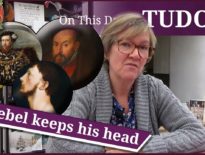On this day in Tudor history, 3rd January 1521, Pope Leo X excommunicated Reformer, German priest and professor of theology Martin Luther from the Catholic Church.
In today's talk, I explain what led to Luther's excommunication, what happened when Luther was called to the Diet of Worms, and what happened next to this famous Reformer.
Here is a my talk from 31st October on Martin Luther and his 95 Theses
Also, on this day in Tudor history, 3rd January 1540 and 1541, Anne of Cleves had very different experiences. Find out more in last year's video:
Also on this day in history:
- 1540 – Official reception of Anne of Cleves at Greenwich Palace.
- 1541 – Anne of Cleves visited Hampton Court Palace to greet her former husband, Henry VIII, and his new wife, Catherine Howard, and to exchange New Year's gifts.
- 1541 – Death of John Clerk, Bishop of Bath and Wells, and diplomat to Henry VIII and Cardinal Wolsey. His final embassy was to the Duke of Cleves in 1540 to try and obtain an annulment of Henry VIII's marriage to Anne of Cleves. He died in Aldgate, London, and was buried at St Botolph's Church.
- 1590 – Death of Robert Boyd, Scottish nobleman, courtier and Protestant, at Kilmarnock. He was buried there in the Laigh Church. Boyd supported Mary, Queen of Scots, but could not support her marriage to the Catholic Lord Darnley, and so joined the Earl of Moray's faction, involving himself in the Chaseabout Raid of summer 1565. He managed to escape punishment by reconciling with Darnley. Boyd was also a member of the jury who acquitted the Earl of Bothwell for Darnley's murder in 1567, and supported his marriage to Mary.
Transcript:
On this day in Tudor history, 3rd January 1521, Pope Leo X issued a papal bull excommunicating reformer, German priest and professor of theology Martin Luther from the Catholic Church.
The Pope had asked Luther to retract his work, “The Ninety-Five Theses on the Power and Efficacy of Indulgences), which Luther had published in 1517, but Luther refused. Luther was then called by Charles V, Holy Roman Emperor, to renounce or defend his religious stance at the Diet of Worms.
By the way, if you don’t know what I mean by the Diet of Worms, something that makes schoolchildren the world over chuckle, a diet was an imperial assembly, a meeting to deliberate issues, and this one was in Worms, a city in Germany.
Luether did not back down, and Charles V issued the Edict of Worms on 25th May 1521, declaring Luther an outlaw and heretic. Luther was able to flee from Worms and spent a year at Wartburg Castle at Eisenach, where he set about translating the New Testament from Greek to German. In 1522, he was able to return to Wittenberg, but as the Encyclopaedia Brittanica notes, it was from this point on that his significance as a public figure began to decline as more radical reformers rose.
Luther married in 1525, marrying Katherine of Bora, a former nun, and one of Luther’s student boarders, who recorded Luther’s comments at the dinner table in the work “Table Talks”, referred to Katherine as Dr Katie. She took an active part in her husband’s work and these theological conversations. The couple had at least 5 children together.
Luther may not have played an active role in the Reformation after he was outlawed, but he carried on teaching and preaching. He died on 18th February 1546 and was laid to rest in the Castle Church in Wittenberg.
In his “Ninety-Five Theses”, the work that led to him being excommunicated on this day in 1521, Luther had, amongst other things, attacked the sale of indulgences, emphasised that salvation was free through Christ by faith and repentance, explained the limiting power of the Pope, emphasised that true repentance should be a way of life and not earned by confession, and declared that it was blasphemous to consider the cross with papal arms on it as of equal worth of Christ's cross.
Luther is known for his doctrine of “Justification by Faith”, the idea that salvation and redemption were only attainable through faith in Christ and by God's grace. Luther said “This one and firm rock, which we call the doctrine of justification, is the chief article of the whole Christian doctrine, which comprehends the understanding of all godliness.” Unlike reformers such as Zwingli, Luther believed in the true presence of Christ in the Eucharist.



Leave a Reply